* Over the past decades, China has risen to the world's second-largest economy and become deeply integrated into the global economy in the course of advancing its reform and opening-up and pursuing modernization.
* In recent years, Beijing has provided a wide range of public goods to help address various security challenges troubling the world.
* China has realized the miracles of fast economic growth and long-term social stability through its own path to modernization and whole-process people's democracy, busting the myth that "modernization means Westernization."
"The path of history is not paved like Nevsky Avenue in St Petersburg; it runs across fields, either dusty or muddy, and cuts through swamps or forest thickets," wrote Nikolay Chernyshevsky, a great Russian scholar and critic in the 19th century.
In two centuries or so, the world has once again reached a crossroads in history where countries are facing momentous choices: between polarization and common prosperity, and between zero-sum game and win-win cooperation.
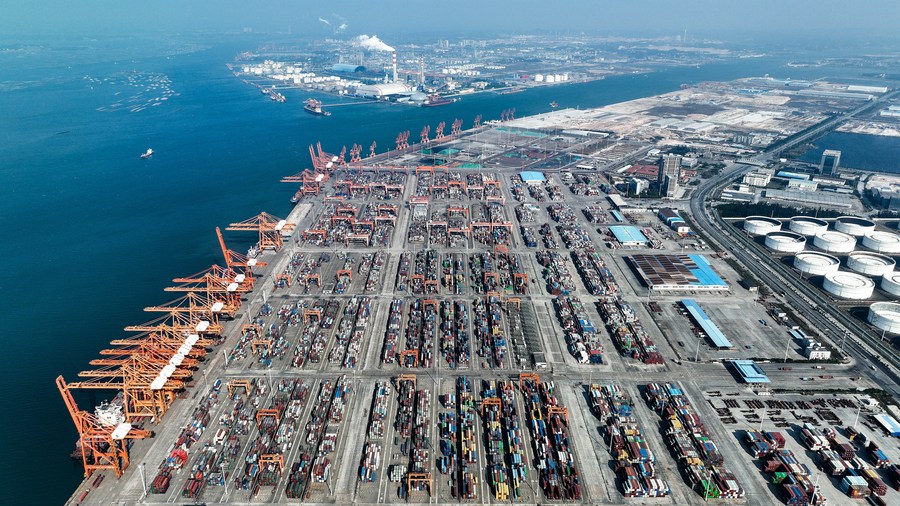
This aerial photo taken on Feb. 25, 2023 shows the container terminal at Qinzhou Port in south China's Guangxi Zhuang Autonomous Region. (Xinhua/Zhang Ailin)
In his speech at the Moscow State Institute of International Relations on March 23, 2013, Chinese President Xi Jinping observed that mankind, by living in the same global village in the same era where history and reality meet, has increasingly emerged as a community of common destiny in which everyone has in him- or herself a little bit of others.
Over the past decade, China has been dedicated to building a community with a shared future for mankind and pursuing shared and win-win development with concrete actions, in a bid to pass on the torch of peace through generations, sustain development and make civilization flourish. With all these efforts, China is trying to answer humanity's epoch question -- what kind of world is hoped for and how to build it.
SUSTAINING DEVELOPMENT
Over the past decades, China has risen to the world's second-largest economy and become deeply integrated into the global economy in the course of advancing its reform and opening-up and pursuing modernization.
Among the essential requirements of Chinese modernization are building a community with a shared future for mankind, and creating a new form of human advancement, according to the Report to the 20th National Congress of the Communist Party of China (CPC).
To this end, the country has taken a host of actions not merely to help stimulate economic growth, but also to secure the right to development of all countries and bridge the North-South divide.
In 2013, Xi proposed the Belt and Road Initiative -- a solution to boosting common development in the world. It has so far brought nearly 1 trillion U.S. dollars of investment, created some 420,000 local jobs, and helped lift nearly 40 million people out of poverty, with the takeoff of numerous transport and industrial projects such as the China-Egypt TEDA Suez Economic and Trade Cooperation Zone.
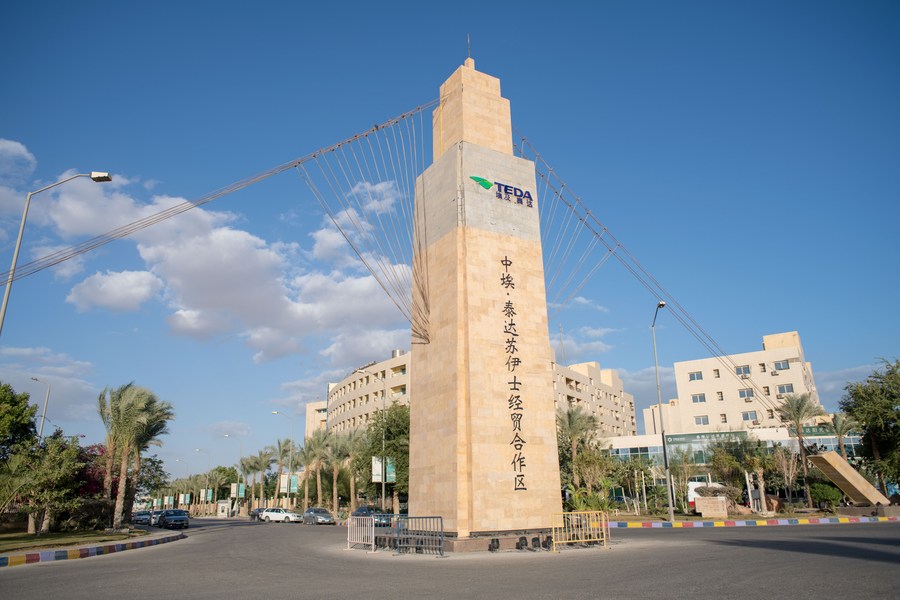
This photo taken on Jan. 14, 2021 shows a view of the China-Egypt TEDA Suez Economic and Trade Cooperation Zone in Ain Sokhna, Egypt. (Xinhua/Wu Huiwo)
Costantinos Berhutesfa, a professor of public policy at Ethiopia's Addis Ababa University, deems the initiative "the kind of second globalization."
As the UN 2030 Agenda for Sustainable Development has suffered setbacks amid successive "black swan" events, Xi put forward the Global Development Initiative in 2021, which aims to synergize with the Agenda and forge a united, equal, balanced and inclusive global development partnership.
In addition, China has established such cooperative platforms as the China International Import Expo, pushed forward free trade projects like the Hainan Free Trade Port, and joined multilateral mechanisms including the Regional Comprehensive Economic Partnership, in its endeavor to help grow an open global economy.
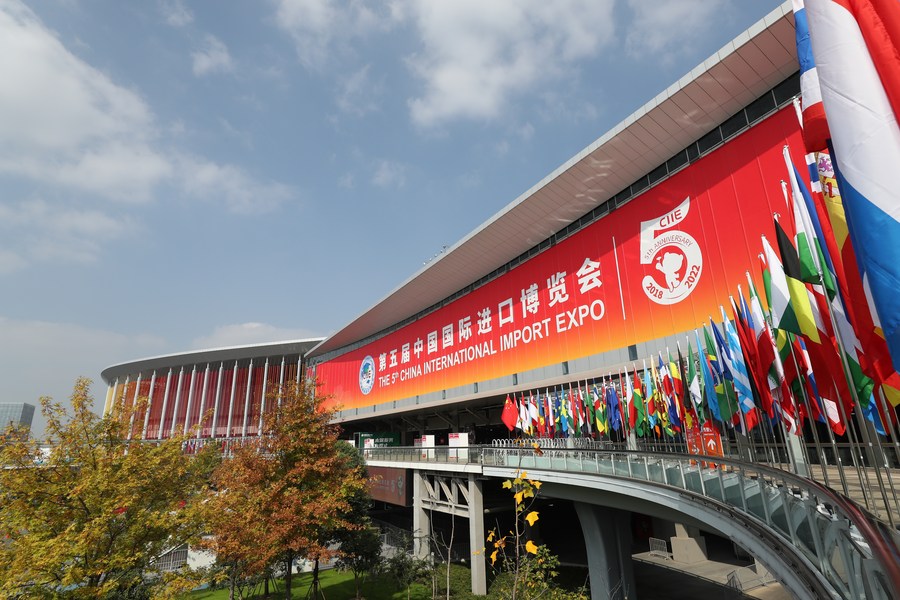
This photo taken on Nov. 2, 2022 shows the west entrance of the National Exhibition and Convention Center (Shanghai), the main venue for the fifth China International Import Expo (CIIE), in east China's Shanghai. (Xinhua/Fang Zhe)
To ensure all countries enjoy equal rights, follow the rules as equals and share equal opportunities, Xi, at the opening of the BRICS Business Forum last year, restated his call for upholding the WTO-centered multilateral trading system, promoting extensive consultation and joint contribution, and enhancing global economic governance.
"The global future of the human species ... is an issue which commands the attention of people everywhere in the world. There are so many things that need to be done. So China can take the lead on that," Martin Albrow, a fellow of the British Academy of Social Sciences, told Xinhua.
Former Egyptian Prime Minister Essam Sharaf said he believes the concept of building a community with a shared future for mankind is "extremely important, especially under the current global conditions."
SAFEGUARDING PEACE
Hermann Hesse, Nobel Prize literature laureate in 1946, during his Nobel banquet speech, preached a mind that is "international and supra-national," and "that ought to serve not war and annihilation, but peace and reconciliation."
In 2017, mentioning Hesse's thought in his address to the United Nations Office at Geneva, Xi called for fostering partnerships based on dialogue, non-confrontation and non-alliance. "As long as we maintain communication and treat each other with sincerity, the 'Thucydides trap' can be avoided," he said.
His appeal is more valid today, as deficits in peace, development, trust and governance are growing, with the flare-up of regional conflicts, the re-emergence of a Cold War mentality, and various security challenges.
Under these circumstances, Xi proposed the Global Security Initiative in 2022, which aims to eliminate the root causes of international conflicts, improve global security governance, encourage joint international efforts to bring more stability and certainty, and promote durable peace and development.
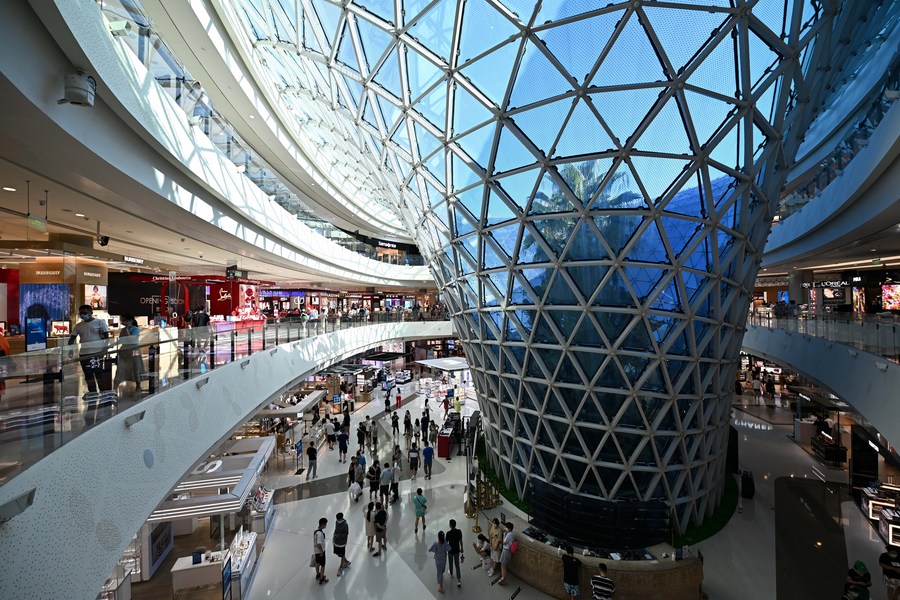
Tourists visit an international duty free mall in Sanya, south China's Hainan Province, June 23, 2022. (Xinhua/Guo Cheng)
Recently, the resumption of diplomatic ties between Saudi Arabia and Iran after talks facilitated by China exemplifies the value of the initiative.
Considering China a reliable and trustworthy partner, Hani Wafa, editor-in-chief of Al Riyadh Newspaper, a major daily in Saudi Arabia, said Beijing's role in the Riyadh-Tehran detente as important as the agreement itself. Such a historic icebreaker may bring hope for peace in the Middle East, he added.
China's role in defending peace can also be seen in the Ukraine crisis. When talking with Russian President Vladimir Putin during his Moscow visit this week, Xi said that on the Ukraine crisis, China has all along abided by the purposes and principles of the UN Charter, followed an objective and impartial position, and actively encouraged peace talks. China has based its position on the merits of the matter per se and stood firm for peace and dialogue and on the right side of history, he added.
These facts demonstrate China's commitment to promoting a new type of international relations and broadening the convergence of interests with other countries.
In recent years, Beijing has provided a wide range of public goods to help address various security challenges troubling the world. For instance, China is a major troop contributor and the second-largest financial contributor to UN peacekeeping operations.
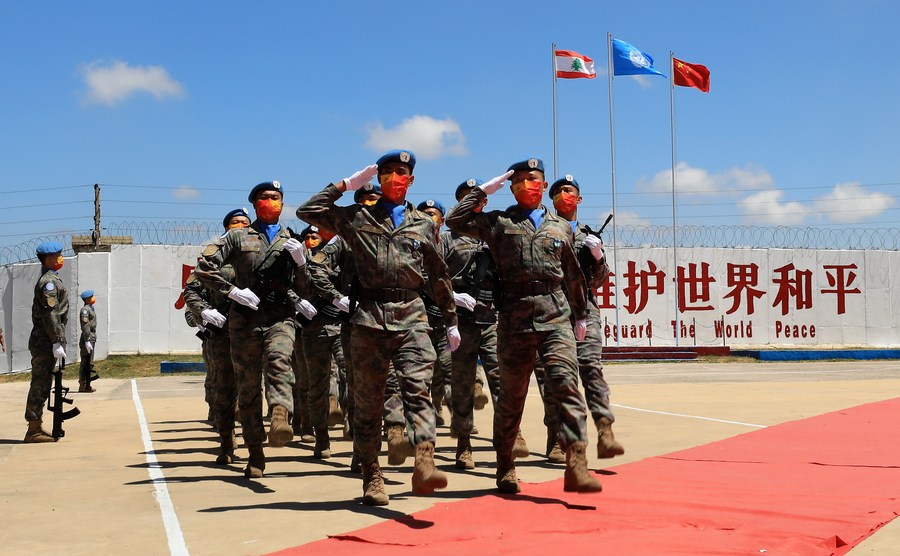
Chinese peacekeepers march at a medal parade ceremony in Hanniyah village, southern Lebanon, July 1, 2022. (Xinhua/Liu Zongya)
"While other countries are sending military forces around the world to engage in wars, establish military bases in other people's countries and so on, China's military goes abroad to help preserve and defend peace," said Keith Bennett, a long-term China specialist and vice chair of Britain's 48 Group Club.
Whereas certain countries are sticking to a zero-sum game or winner-takes-all mindset, China has detailed proposals to make the idea of a shared future a reality, he added.
MAKING CIVILIZATIONS FLOURISH
China's pursuit of building a community with a shared future for mankind derives from celebrated elements of Chinese traditional culture.
In a world where peace, development, equity, justice, democracy, and freedom become the common values of humanity, countries and regions have chosen different paths to modernization, which are rooted in their unique and long civilizations.
In the case of China, it has realized the miracles of fast economic growth and long-term social stability through its own path to modernization and whole-process people's democracy, busting the myth that "modernization means Westernization."
Therefore, it holds that tolerance, coexistence, exchanges and mutual learning among different civilizations play an irreplaceable role in advancing humanity's modernization process.
At the CPC in Dialogue with World Political Parties High-Level Meeting last week, Xi proposed the Global Civilization Initiative, calling for respecting the diversity of civilizations, advocating the common values of humanity, valuing the inheritance and innovation of civilizations, and strengthening international people-to-people exchanges and cooperation.
"We fully agree with the four proposals put forward by Chinese President Xi in the Global Civilization Initiative," said South African President Cyril Ramaphosa, also president of the African National Congress, who participated in the dialogue, adding the initiative is vital to the world today.
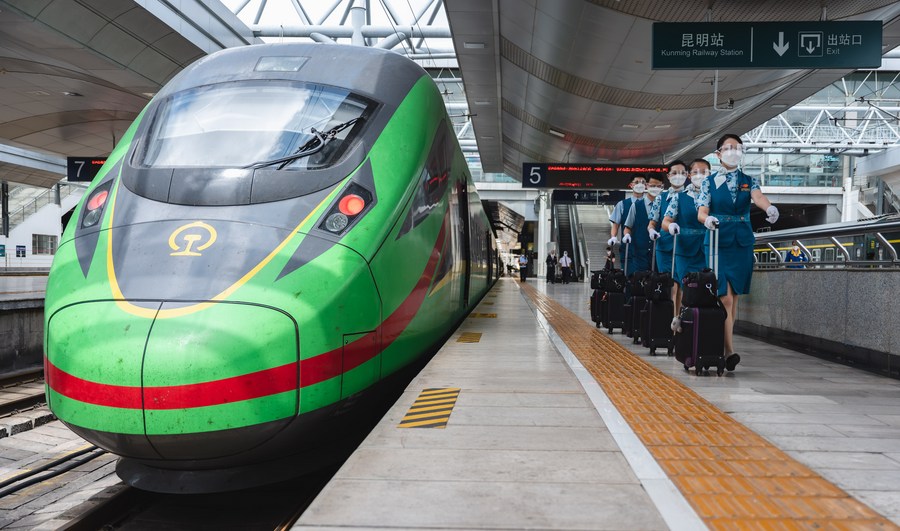
Stewards of China Railway Kunming Bureau Group Co., Ltd. are pictured in Kunming Railway Station in southwest China's Yunnan Province, June 2, 2022. As a landmark project under the Belt and Road Initiative, the China-Laos Railway connects China's Kunming with the Lao capital Vientiane. (Xinhua/Wang Guansen)
Asadollah Badamchian, general secretary of Islamic Motalefeh Party of Iran, said pursuing the China-proposed move is "duty-bound."
"The world's peoples should be invited to put their civilizations and cultures in the global civilization basket, and then, they, within the present framework of global relations and communications and in view of the industry, progress and future advances, altogether should move toward a civilization built upon all human civilizations," he said.





